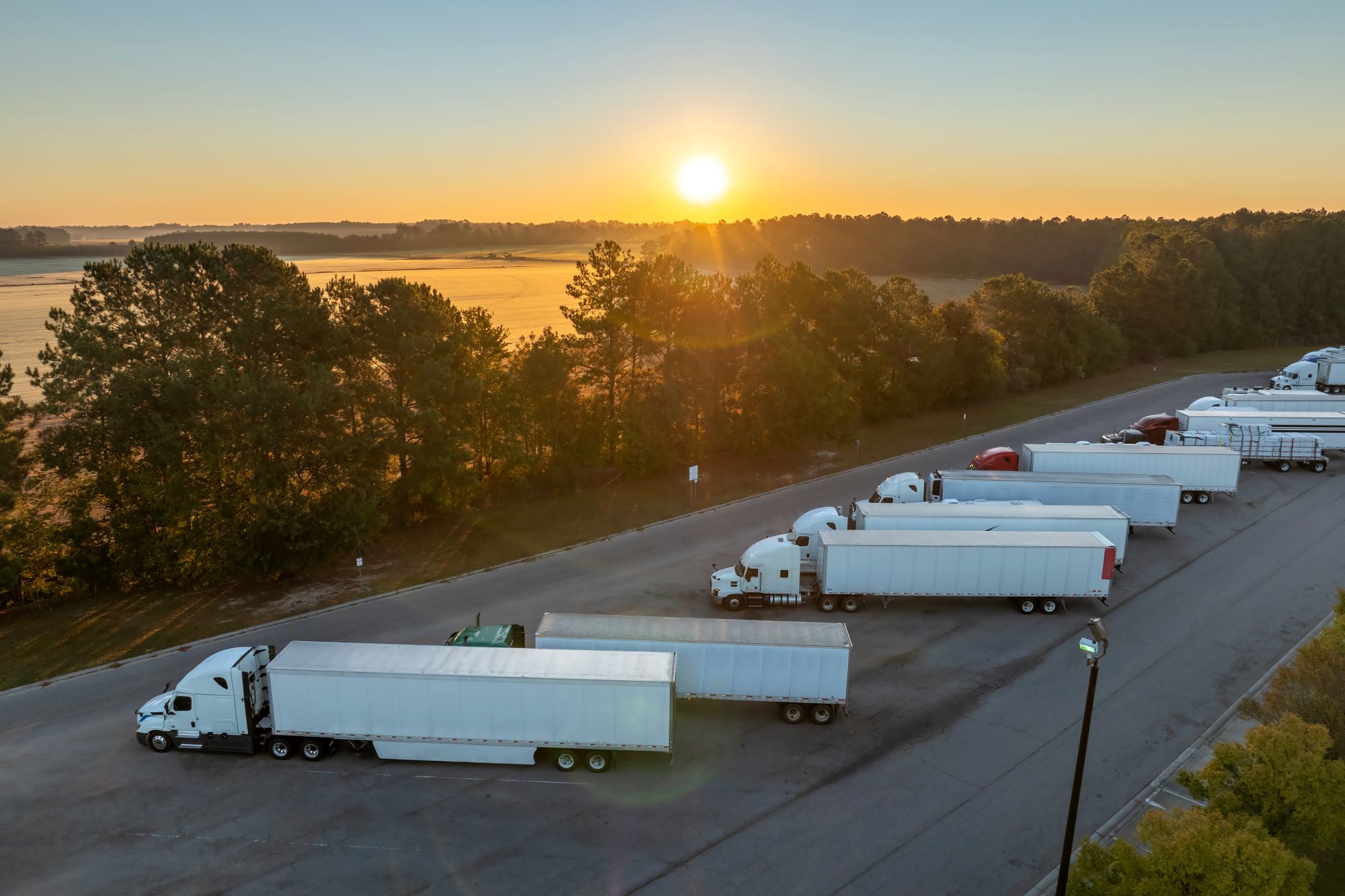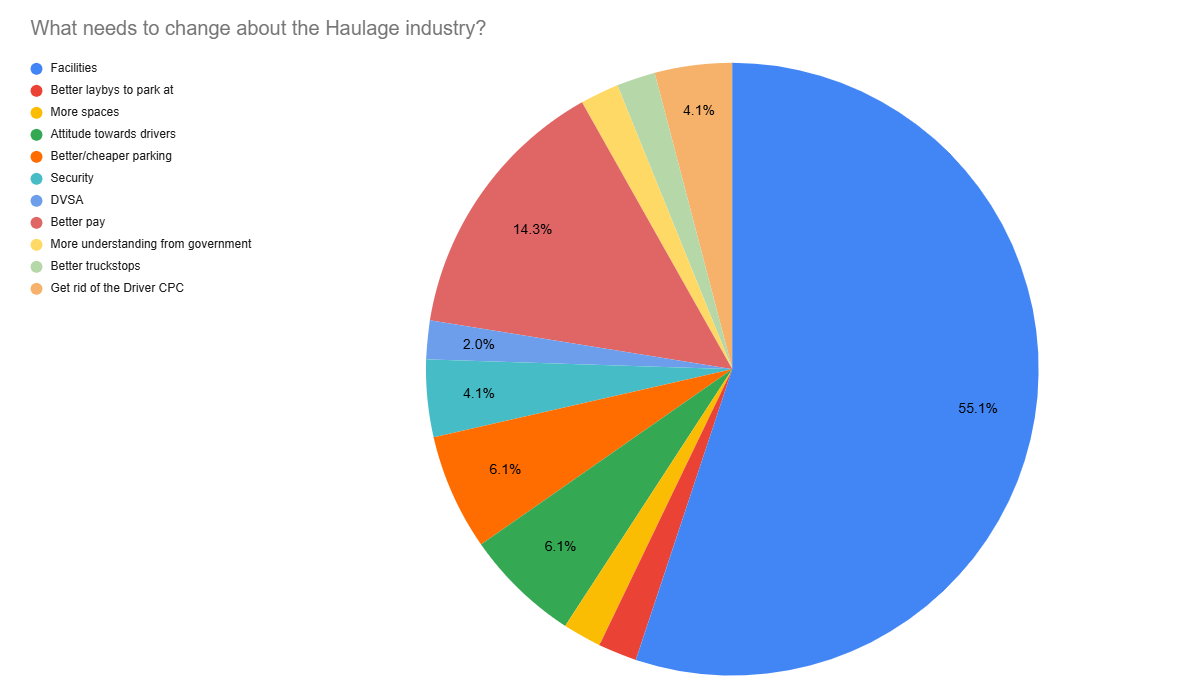
Susie Jones
Gli autotrasportatori chiedono una riforma del settore
Creato: 05/02/2025
•
Aggiornato: 05/02/2025
Attualmente, le donne alla guida di mezzi pesanti nel Regno Unito rappresentano solo l'1% di tutti i conducenti - una cifra che è aumentata del 144% nell'ultimo decennio, con l'introduzione di un maggior numero di iniziative volte a promuovere la diversità e a colmare la carenza di conducenti.
Un articolo di Fleetpoint descrive i molti modi in cui l'industria potrebbe attirare più donne nel settore:
Coltivare un ambiente di lavoro favorevole e accogliente.
Potenziamento delle infrastrutture e dei servizi.
Modalità di lavoro flessibili e adatte alle famiglie.
Creare percorsi chiari per la crescita professionale.
Ciononostante, gli autisti sui [social media] (https://www.facebook.com/photo/?fbid=988050383364634&set=a.482170237285987&locale=en_GB) hanno sostenuto che queste sfide di lunga data nel settore devono essere affrontate per tutti prima di introdurre nuove iniziative per colmare la carenza di autisti.
Carenza di autisti: a che punto è il settore?
La carenza di autisti è un problema persistente per il settore dei trasporti, ma dopo la COVID-19 e la Brexit ha raggiunto livelli critici. Nel 2024, in Europa, Norvegia e Regno Unito mancheranno oltre 233.000 autisti di camion, un numero destinato a superare i 745.000 entro il 2028 a causa dell'invecchiamento della forza lavoro.
Il settore è ancora alle prese con le conseguenze e sta lavorando per implementare nuove iniziative per promuovere la diversità, migliorare le condizioni di lavoro e colmare il divario di forza lavoro.
Il governo ha messo in atto circa [33](https://www.gov.uk/government/topical-events/hgv-driver-shortage-uk-government-response/about#:~:text=We%20extended%20dangerous%20goods%20(ADR,per%20fare%20una%20formazione%20di%20aggiornamento%20ora.) azioni per far fronte alla carenza di autisti di mezzi pesanti nel Regno Unito. Tra cui, ma non solo:
Aumentare l'efficienza delle catene di fornitura esistenti.
Fornire assistenza e formazione ai nuovi autisti di mezzi pesanti.
Espansione della capacità di collaudo dei conducenti di veicoli pesanti.
Migliorare i processi di autorizzazione.
Migliorare le condizioni.
Garantire la stabilità della catena di approvvigionamento dei carburanti.

Cosa deve cambiare? I conducenti dicono la loro.
Il 49% degli autisti sui social media ha sostenuto che i cambiamenti devono essere attuati indipendentemente dal genere, con il 27% delle donne autiste di mezzi pesanti che concordano sul fatto che il settore deve evolversi per tutti. Il 24% ha dichiarato che il lavoro non è più attraente, evidenziando la necessità di un cambiamento nel settore. Quindi, cosa vogliono vedere cambiato gli autisti?
Strutture
Il 55% desidera che le strutture siano migliorate per tutti:
"Ci devono essere strutture migliori e un trattamento migliore, punto e basta. L'intero settore è un disastro e noi siamo maltrattati".
"I servizi sono terribili per tutti gli automobilisti, uomini e donne".
Nel novembre 2024, un [sondaggio di Transport Focus] (https://www.britsafe.org/safety-management/2024/uk-truckers-why-more-action-is-needed-to-make-their-working-lives-safer-and-healthier#:~:text=Improving%20roadside%20facilities&text=Drivers%20have%20long%20been%20telling,asked%20expressed%20dissatisfaction%20with%20both.) ha rilevato che due terzi degli autisti sono insoddisfatti delle strutture degli autogrill: servizi sporchi, opzioni alimentari scadenti e mancanza di spazi sociali sono i principali problemi.
Il governo e l'industria del trasporto hanno adottato misure significative investendo 14 milioni di sterline per promuovere l'innovazione e migliorare le condizioni di lavoro.
Nell'ottobre 2024, 23 candidati selezionati hanno ottenuto fino a 4,5 milioni di sterline per migliorare le loro stazioni di servizio. I miglioramenti includeranno nuove docce, ristoranti e funzioni di sicurezza migliorate per garantire una maggiore tranquillità agli autisti. Inoltre, il progetto prevede la creazione di circa 430 posti auto per i veicoli pesanti.
Paga
Il 14% degli autisti ritiene che un aumento dei salari incoraggerebbe un maggior numero di persone a entrare nel settore:
"Renderlo attraente per tutti, aumentare i salari".
L'aumento dei salari avrà un costo significativo per i leader del settore. Se il salario medio dei conducenti di camion aumentasse in linea con il National Living Wage, gli operatori delle flotte potrebbero dover affrontare un costo aggiuntivo di 1,5 miliardi di sterline all'anno.
Ciononostante, gli investimenti miglioreranno i tassi di fidelizzazione, ridurranno le spese di assunzione e i costi di formazione. Offrire stipendi più alti non solo renderebbe la professione più attraente per i nuovi arrivati, ma riconoscerebbe anche il ruolo critico che i conducenti svolgono nel mantenimento della catena di approvvigionamento.
Atteggiamento nei confronti dei conducenti
Nel corso degli anni, l'opinione pubblica nei confronti dei camionisti si è evoluta in modo significativo. La vita dei camionisti è stata spesso romanzata nei film e nei media popolari, inducendo molti a credere che avessero vita facile. Tuttavia, li ha anche presentati come eroi lavoratori, un'immagine che si è deteriorata nel tempo.
Verso la fine del XX secolo, la percezione è cambiata quando le condizioni di lavoro sono diventate più difficili e gli autisti di camion sono stati oggetto di stereotipi ingiusti, spesso a causa di una rappresentazione errata da parte dei media e talvolta di alcuni autisti inesperti. Questi stereotipi negativi si sono attenuati durante la pandemia di COVID-19, quando è cresciuto l'apprezzamento dell'opinione pubblica per i camionisti.
Oggi c'è rispetto per i camionisti, ma il settore è ancora afflitto da stereotipi e atteggiamenti negativi. Un aspetto che il 6% degli autisti vorrebbe veder cambiare:
"Ripensando alla Covid, siamo stati considerati degli eroi, ma poi la situazione è tornata alla normalità. Non c'è da stupirsi che gli attuali autisti, uomini e donne, vogliano lasciare il settore. Sono stufi del trattamento di merda che subiscono quotidianamente".
"Sarebbe bello non essere trattati come se fossi feccia".
Negli ultimi anni, l'ascesa dei social media ha iniziato a sfidare e modificare le percezioni negative. Molti autisti si rivolgono a piattaforme come TikTok e Instagram per condividere approfondimenti sul loro ruolo, sfatare idee sbagliate e guadagnarsi il rispetto di chi non è del settore.
I feedback mostrano l'urgente necessità per l'industria del trasporto di implementare cambiamenti per attrarre e mantenere gli autisti attuali e nuovi. La sottorappresentazione delle donne rimane una sfida significativa e investire in strutture che rispondano alle loro esigenze è fondamentale. Tuttavia, questo investimento deve essere inclusivo e andare a beneficio di tutta la forza lavoro.

In quali Paesi c'è carenza di autisti di camion?
I paesi europei sono stati i più colpiti: molte aziende di autotrasporti non sono in grado di espandere la propria attività perché non riescono a trovare lavoratori qualificati.
L'Europa ha una popolazione di camionisti che invecchia, con un'età media di 47 anni (https://www.iru.org/news-resources/newsroom/half-european-truck-operators-cant-expand-due-driver-shortages#:~:text=The%20EU%2C%20Norway%20and%20the,an%20average%20age%20of%2047.). Un terzo dei camionisti ha più di 55 anni e si prevede che andrà in pensione nei prossimi dieci anni. Inoltre, meno del 5% dei conducenti di camion in Europa ha un'età inferiore ai 25 anni, il che evidenzia il vuoto che si creerà una volta che la forza lavoro sarà andata in pensione.
Esiste una giornata di ringraziamento per gli autisti di camion?
Il [HGV Drivers Day] (https://https://snapacc.com/newsroom/hgv-drivers-day-2025-giving-truckers-a-voice/) si svolge il 22 gennaio ed è stato istituito da NN1 Personnel. La giornata ha lo scopo di celebrare i camionisti e tutto ciò che fanno per l'economia e la società.
Quali sono le prospettive del settore degli autotrasporti per il 2025?
Dal nostro blog [The Road Ahead for 2025] (https://snapacc.com/newsroom/the-road-ahead-for-2025-truck-industry-trends-to-expect/), prevediamo che quest'anno il settore degli autotrasporti avrà un ruolo di primo piano:
Abbracciare i vantaggi dell'IA.
Affrontare il divario di genere e la carenza di autisti.
Promuovere un'industria più verde.
Aumento del trasporto merci a lunga distanza.


